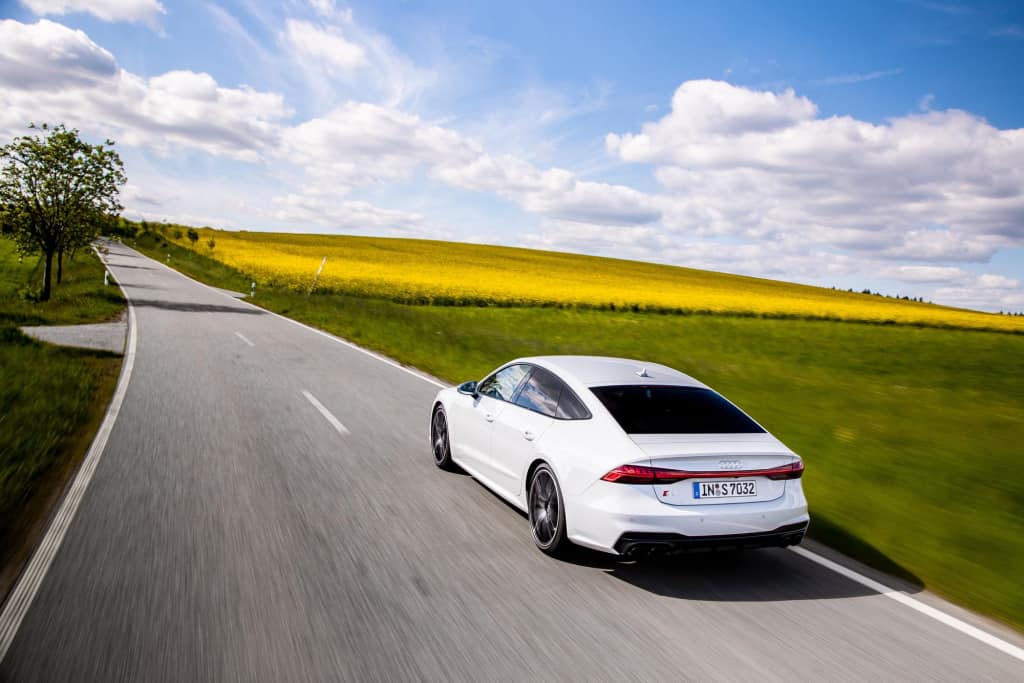Run me through the basics…
The S7 is based on the A6, Audi’s BMW 5-series fighter. The ‘7’ means there’s a more coupe-like rear end, though there are still four doors, rear headroom remains more than acceptable and there’s a generous boot too (choose the highly similar S6 saloon or estate if ultimate practicality is the name of the game). The S part of the badge means this is the second-most powerful 7 model, below the incoming petrol RS7.
As usual for an S7, quattro all-wheel drive and an automatic transmission is standard, with 20-inch alloys too (21s optional) and a choice of coil-spring or optional air suspension.
The engine is the big news. The new 3.0-litre turbodiesel is similar to the one in the A6 50TDI, and gets the same mild-hybrid system too – it lets the S6 coast for up to 40 seconds, saving fuel. But it’s also boosted by an electrically powered compressor (EPC), which acts like a small turbocharger but responds more rapidly. With the EPC taking care of lower-end performance, Audi has fitted a larger turbocharger, key to the huge hit of torque in the mid-range.
What’s the Audi S7 like to drive?
It’s very good. There’s still a little lag – despite the EPC – and you’ll miss the old petrol at higher revs, but between 2000 and 3500rpm it’s properly rapid, and the eight closely stacked gear ratios make it easy to stay in that relatively narrow powerband. Get it all right and the power never seems to stop surging. It’s also a smooth engine with an exhaust note that offers welcome encouragement with a deep but subtle rumble under acceleration. No clatters or rattles here.
It’s good news on the chassis front too, even with two tonnes to lug about: the S7 feels as pinned down as you’d hope of a quattro through corners, but it has a more engaging, rear-biased feel than its predecessors. It is worth noting, though, that our test car got the optional rear-wheel steering and sport differential, which would’ve helped agility.
We also tried both the standard chassis and the optional air springs. The standard set-up strikes a great balance between comfort and control, where the more comfort-focussed air springs had a significantly floatier feel. We’d save the cash.
In a nutshell
Reinventing the Audi S7 as a diesel is a brave move and one that might confuse some customers. But it suits the S7 brilliantly, with a balance of impressive refinement, thumping mid-range performance and longer gaps between re-fills than a petrol could ever manage – Audi claims up to 620 miles. That the S7 also sounds purposeful and handles so well only adds to its appeal.
If you really want petrol, you’ll have to hold out – and save up – for an RS7, but we suspect the S7 strikes the sweeter balance for the typical sports saloon buyer.
Search and finance your next used Audi S7 with ChooseMyCar, or view the entire Audi range.
Similar Car Reviews
A powerful twin-turbocharged V6 Saloon, the Alfa Romeo Giulia Veloce successfully translates the excitement of the excellent Quadrifoglio to a significantly lower price bracket.
Few cars quite define their class quite like the BMW 3-series, it truly defines the mid-sized engine executive car range. BMW really maintains this with their BMW 330i model.
The humble Ford Focus, on the other hand, is quietly and consistently been in the top 10 selling cars in the UK market, with its blend of practicality, versatility and slick gearboxes, it’s always been a popular choice with consumers.
There is then the lesser-known Lexus ES, not well known in the UK, it’s actually been around for seven generations now. If you’re looking for a more spacious kind of Premium car, the Lexus ES300h f Sport makes a strong case for itself.
Specs
| Price | £68,000 |
|---|---|
| Drivetrain | 2967cc 24v V6 turbodiesel, eight-speed auto, all-wheel drive |
| Performance | 344bhp @ 3850rpm, 516lb ft @ 2500-3100rpm |
| 0-62mph | 5.1sec |
| Top Speed | 155mph (Limited) |
| Efficiency | 43.5mpg, 170g/km CO2 |
| Weight | 2010kg |
| Length/width/height | 4969/1908/1417 |






